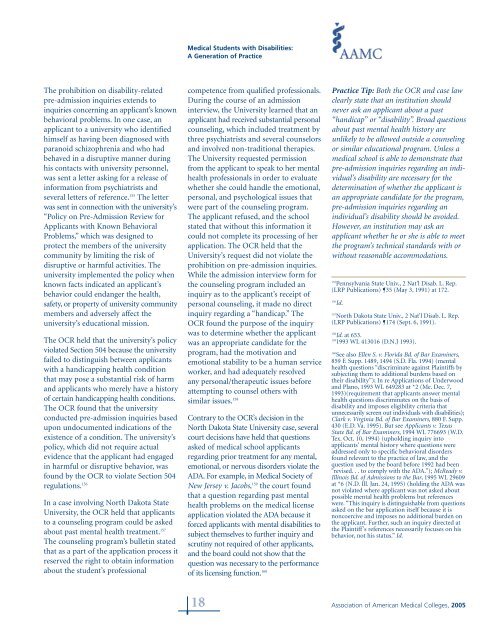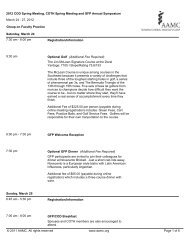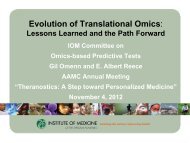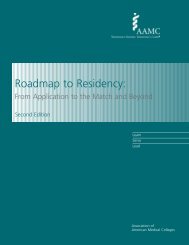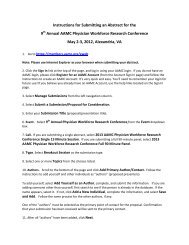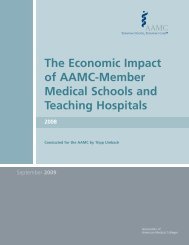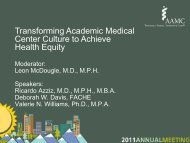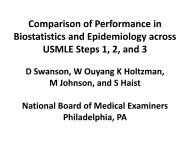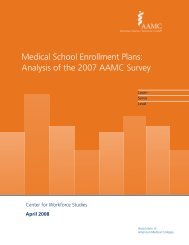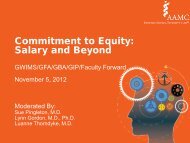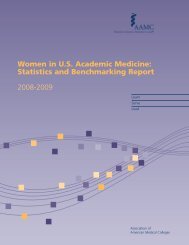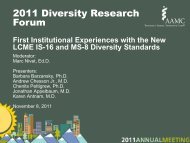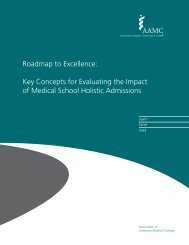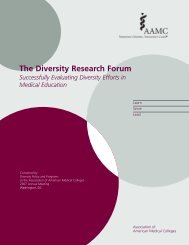Medical Students with Disabilities: A Generation of Practice
Medical Students with Disabilities: A Generation of Practice
Medical Students with Disabilities: A Generation of Practice
You also want an ePaper? Increase the reach of your titles
YUMPU automatically turns print PDFs into web optimized ePapers that Google loves.
<strong>Medical</strong> <strong>Students</strong> <strong>with</strong> <strong>Disabilities</strong>:<br />
A <strong>Generation</strong> <strong>of</strong> <strong>Practice</strong><br />
The prohibition on disability-related<br />
pre-admission inquiries extends to<br />
inquiries concerning an applicant’s known<br />
behavioral problems. In one case, an<br />
applicant to a university who identified<br />
himself as having been diagnosed <strong>with</strong><br />
paranoid schizophrenia and who had<br />
behaved in a disruptive manner during<br />
his contacts <strong>with</strong> university personnel,<br />
was sent a letter asking for a release <strong>of</strong><br />
information from psychiatrists and<br />
several letters <strong>of</strong> reference. 155 The letter<br />
was sent in connection <strong>with</strong> the university’s<br />
“Policy on Pre-Admission Review for<br />
Applicants <strong>with</strong> Known Behavioral<br />
Problems,” which was designed to<br />
protect the members <strong>of</strong> the university<br />
community by limiting the risk <strong>of</strong><br />
disruptive or harmful activities. The<br />
university implemented the policy when<br />
known facts indicated an applicant’s<br />
behavior could endanger the health,<br />
safety, or property <strong>of</strong> university community<br />
members and adversely affect the<br />
university’s educational mission.<br />
The OCR held that the university’s policy<br />
violated Section 504 because the university<br />
failed to distinguish between applicants<br />
<strong>with</strong> a handicapping health condition<br />
that may pose a substantial risk <strong>of</strong> harm<br />
and applicants who merely have a history<br />
<strong>of</strong> certain handicapping health conditions.<br />
The OCR found that the university<br />
conducted pre-admission inquiries based<br />
upon undocumented indications <strong>of</strong> the<br />
existence <strong>of</strong> a condition. The university’s<br />
policy, which did not require actual<br />
evidence that the applicant had engaged<br />
in harmful or disruptive behavior, was<br />
found by the OCR to violate Section 504<br />
regulations. 156<br />
In a case involving North Dakota State<br />
University, the OCR held that applicants<br />
to a counseling program could be asked<br />
about past mental health treatment. 157<br />
The counseling program’s bulletin stated<br />
that as a part <strong>of</strong> the application process it<br />
reserved the right to obtain information<br />
about the student’s pr<strong>of</strong>essional<br />
competence from qualified pr<strong>of</strong>essionals.<br />
During the course <strong>of</strong> an admission<br />
interview, the University learned that an<br />
applicant had received substantial personal<br />
counseling, which included treatment by<br />
three psychiatrists and several counselors<br />
and involved non-traditional therapies.<br />
The University requested permission<br />
from the applicant to speak to her mental<br />
health pr<strong>of</strong>essionals in order to evaluate<br />
whether she could handle the emotional,<br />
personal, and psychological issues that<br />
were part <strong>of</strong> the counseling program.<br />
The applicant refused, and the school<br />
stated that <strong>with</strong>out this information it<br />
could not complete its processing <strong>of</strong> her<br />
application. The OCR held that the<br />
University’s request did not violate the<br />
prohibition on pre-admission inquiries.<br />
While the admission interview form for<br />
the counseling program included an<br />
inquiry as to the applicant’s receipt <strong>of</strong><br />
personal counseling, it made no direct<br />
inquiry regarding a “handicap.” The<br />
OCR found the purpose <strong>of</strong> the inquiry<br />
was to determine whether the applicant<br />
was an appropriate candidate for the<br />
program, had the motivation and<br />
emotional stability to be a human service<br />
worker, and had adequately resolved<br />
any personal/therapeutic issues before<br />
attempting to counsel others <strong>with</strong><br />
similar issues. 158<br />
Contrary to the OCR’s decision in the<br />
North Dakota State University case, several<br />
court decisions have held that questions<br />
asked <strong>of</strong> medical school applicants<br />
regarding prior treatment for any mental,<br />
emotional, or nervous disorders violate the<br />
ADA. For example, in <strong>Medical</strong> Society <strong>of</strong><br />
New Jersey v. Jacobs, 159 the court found<br />
that a question regarding past mental<br />
health problems on the medical license<br />
application violated the ADA because it<br />
forced applicants <strong>with</strong> mental disabilities to<br />
subject themselves to further inquiry and<br />
scrutiny not required <strong>of</strong> other applicants,<br />
and the board could not show that the<br />
question was necessary to the performance<br />
<strong>of</strong> its licensing function. 160<br />
<strong>Practice</strong> Tip: Both the OCR and case law<br />
clearly state that an institution should<br />
never ask an applicant about a past<br />
“handicap” or “disability”. Broad questions<br />
about past mental health history are<br />
unlikely to be allowed outside a counseling<br />
or similar educational program. Unless a<br />
medical school is able to demonstrate that<br />
pre-admission inquiries regarding an individual’s<br />
disability are necessary for the<br />
determination <strong>of</strong> whether the applicant is<br />
an appropriate candidate for the program,<br />
pre-admission inquiries regarding an<br />
individual’s disability should be avoided.<br />
However, an institution may ask an<br />
applicant whether he or she is able to meet<br />
the program’s technical standards <strong>with</strong> or<br />
<strong>with</strong>out reasonable accommodations.<br />
155<br />
Pennsylvania State Univ., 2 Nat'l Disab. L. Rep.<br />
(LRP Publications) 35 (May 3, 1991) at 172.<br />
156<br />
Id.<br />
157<br />
North Dakota State Univ., 2 Nat'l Disab. L. Rep.<br />
(LRP Publications) 174 (Sept. 6, 1991).<br />
158<br />
Id. at 653.<br />
159<br />
1993 WL 413016 (D.N.J 1993).<br />
160<br />
See also Ellen S. v. Florida Bd. <strong>of</strong> Bar Examiners,<br />
859 F. Supp. 1489, 1494 (S.D. Fla. 1994) (mental<br />
health questions “discriminate against Plaintiffs by<br />
subjecting them to additional burdens based on<br />
their disability”); In re Applications <strong>of</strong> Underwood<br />
and Plano, 1993 WL 649283 at *2 (Me. Dec. 7,<br />
1993)(requirement that applicants answer mental<br />
health questions discriminates on the basis <strong>of</strong><br />
disability and imposes eligibility criteria that<br />
unnecessarily screen out individuals <strong>with</strong> disabilities);<br />
Clark v. Virginia Bd. <strong>of</strong> Bar Examiners, 880 F. Supp.<br />
430 (E.D. Va. 1995). But see Applicants v. Texas<br />
State Bd. <strong>of</strong> Bar Examiners, 1994 WL 776693 (W.D.<br />
Tex. Oct. 10, 1994) (upholding inquiry into<br />
applicants’ mental history where questions were<br />
addressed only to specific behavioral disorders<br />
found relevant to the practice <strong>of</strong> law, and the<br />
question used by the board before 1992 had been<br />
"revised. . . to comply <strong>with</strong> the ADA."); McReady v.<br />
Illinois Bd. <strong>of</strong> Admissions to the Bar, 1995 WL 29609<br />
at *6 (N.D. Ill. Jan. 24, 1995) (holding the ADA was<br />
not violated where applicant was not asked about<br />
possible mental health problems but references<br />
were. “This inquiry is distinguishable from questions<br />
asked on the bar application itself because it is<br />
noncoercive and imposes no additional burden on<br />
the applicant. Further, such an inquiry directed at<br />
the Plaintiff 's references necessarily focuses on his<br />
behavior, not his status.” Id.<br />
18 Association <strong>of</strong> American <strong>Medical</strong> Colleges, 2005


